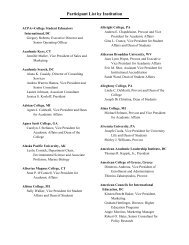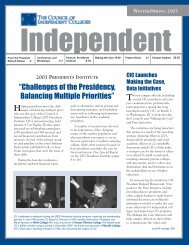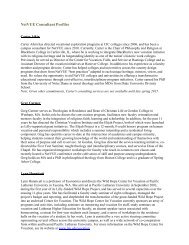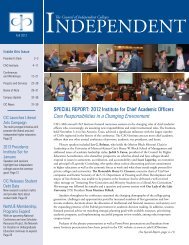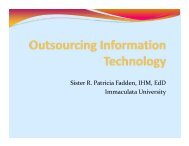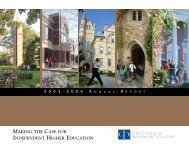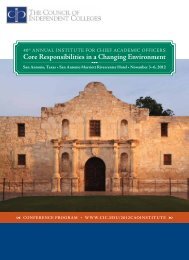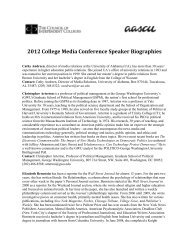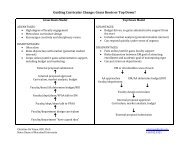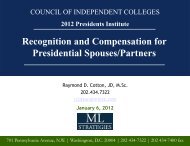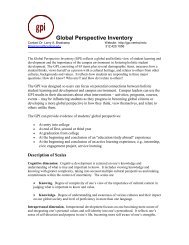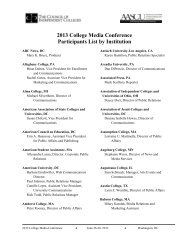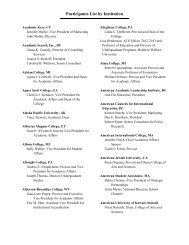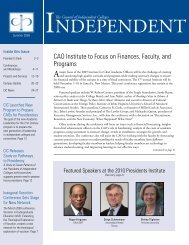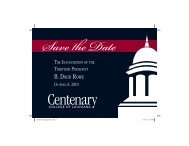Meeting the Challenge: - The Council of Independent Colleges
Meeting the Challenge: - The Council of Independent Colleges
Meeting the Challenge: - The Council of Independent Colleges
You also want an ePaper? Increase the reach of your titles
YUMPU automatically turns print PDFs into web optimized ePapers that Google loves.
Serving Students Well: <strong>Independent</strong> <strong>Colleges</strong> Today<br />
“<strong>The</strong> idea [<strong>of</strong> Warren Wilson College’s service-learning requirement] was to encourage<br />
students to give back to society. It became such a strong component <strong>of</strong> <strong>the</strong> ethic<br />
<strong>of</strong> <strong>the</strong> college that we decided to institutionalize it.”<br />
—Douglas Orr, Jr., President, Warren Wilson College<br />
within and outside <strong>of</strong> <strong>the</strong> university. <strong>The</strong> Alverno approach is<br />
usually called “ability-based education.”<br />
Under Alverno’s system, students must demonstrate<br />
mastery in eight areas before <strong>the</strong>y graduate: communication,<br />
analysis, problem-solving, social interaction, effective<br />
citizenship, aes<strong>the</strong>tic engagement (that is, involvement in <strong>the</strong><br />
arts), making value judgments and independent decisions,<br />
and developing a global perspective. Within each <strong>of</strong> <strong>the</strong>se<br />
eight areas, Alverno has defined six levels <strong>of</strong> mastery. Students<br />
must reach <strong>the</strong> sixth level in <strong>the</strong>ir major and <strong>the</strong> fourth<br />
level in o<strong>the</strong>r parts <strong>of</strong> <strong>the</strong> curriculum. Each course includes<br />
mastery requirements at a specific level. Students demonstrate<br />
<strong>the</strong>ir mastery in a number <strong>of</strong> ways, including presentations,<br />
small group interactions, and writing.<br />
Alverno’s distinctive approach has been in place<br />
for more than three decades. “<strong>The</strong> <strong>the</strong>ory was that if you<br />
give students more elaborate feedback, and don’t focus<br />
so much on competition among students for grades as<br />
on how students develop as learners, that would lead to a<br />
better educational outcome,” says Mary Meehan, Alverno’s<br />
president. Meehan is <strong>the</strong> first lay leader <strong>of</strong> <strong>the</strong> college,<br />
which was originally established to educate nuns entering<br />
<strong>the</strong> Franciscan order. Today only about 30 percent <strong>of</strong> <strong>the</strong><br />
students are Catholic. More than 70 percent are firstgeneration<br />
college students, and many are members <strong>of</strong><br />
historically under-represented minority groups. More than<br />
90 percent <strong>of</strong> <strong>the</strong> students receive financial aid.<br />
At Alverno <strong>the</strong> research <strong>of</strong> faculty members typically<br />
does not focus on <strong>the</strong>ir discipline, but on <strong>the</strong> teaching <strong>of</strong><br />
<strong>the</strong>ir discipline—for example, how to teach history most<br />
effectively. Alverno’s approach, says Meehan, “requires<br />
enormous energy, dedication, and will on <strong>the</strong> part <strong>of</strong> <strong>the</strong><br />
faculty.” But <strong>the</strong> efforts pay <strong>of</strong>f in a variety <strong>of</strong> ways, including<br />
very high pass rates on pr<strong>of</strong>essional certification examinations<br />
in fields such as nursing and teaching.<br />
Warren Wilson College in North Carolina, which<br />
enrolls about 800 undergraduates, <strong>of</strong>fers yet ano<strong>the</strong>r<br />
approach to undergraduate education. From its beginning<br />
in 1894, work outside <strong>the</strong> classroom was deemed an<br />
essential part <strong>of</strong> <strong>the</strong> college’s mission. To earn a diploma, all<br />
students must work 15 hours a week in a campus-related<br />
job. <strong>The</strong> work can take many forms, such as helping on <strong>the</strong><br />
college farm or assisting in <strong>the</strong> accounting <strong>of</strong>fice, but every<br />
student must take part. Those who fail to fulfill <strong>the</strong>ir work<br />
responsibilities do not graduate. “This is much more than<br />
work study,” says President Douglas Orr, Jr. “Students are<br />
learning a larger lesson <strong>of</strong> working as part <strong>of</strong> a community.”<br />
Along with <strong>the</strong> work requirement, Warren Wilson has<br />
a service-learning requirement that dates back 50 years.<br />
Students must spend a minimum <strong>of</strong> 100 hours in <strong>of</strong>f-campus<br />
46



